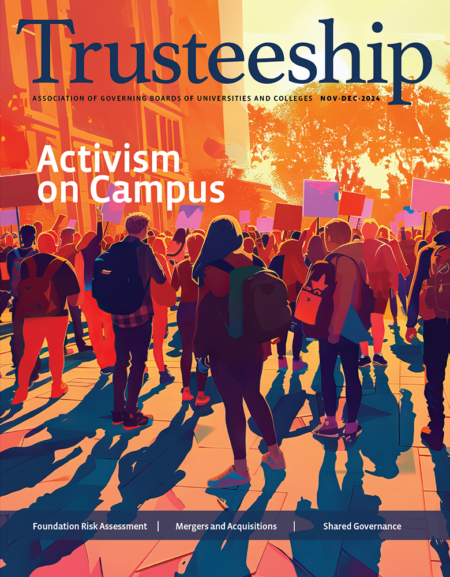
Social justice—including our longstanding record of environmental, social, and governance (ESG) investing—is at San Francisco State University’s core: the Wall Street Journal and U.S. News recently ranked us among the top five most diverse schools in the country and among the top 10 nationally for upward socioeconomic mobility, respectively. Similarly, student activism holds a significant place in San Francisco State’s institutional history, most notably the student strike of 1968 that led to the establishment of ethnic studies as an academic discipline and the first-ever College of Ethnic Studies. In more recent years, the Palestinian-Israeli conflict has proven to be a particularly challenging flashpoint on our campus, in which the university struggled—with uneven success—to balance free speech, academic freedom, and the right of all our students to feel safe and welcome on campus. Last spring semester, we were among the many institutions nationally where student activists established an encampment protesting the war in Gaza. Given our history and the mission we’re proud to serve, in spring of 2024 we earnestly sought a way to find potential in this moment of turmoil, even as our university community continued to digest the dual tragedies of the Hamas attacks of October 2023 and the massive civilian deaths in Gaza.
The San Francisco State University Foundation (SF State Foundation)—the university’s institutionally affiliated foundation—proved able to work with student activists and the administration to effect positive institutional change while building on our core commitments to a broadly inclusive university community. While the student activists initially sought full divestment of all university resources and programs from Israel, San Francisco State University President Lynn Mahoney quickly stated that the university would not discuss any region-specific changes. She proposed, instead, a summer-long dialog with the SF State Foundation leadership, including myself and members of our investment committee, during which we could forge common ground on enhancing our already strong ESG commitments to reflect a global commitment to human rights, increase transparency into our endowment, and include weapons manufacturers in our screenings. Importantly, all these changes were region-neutral and not specific to any single conflict.
Over the course of the summer, this ESG Working Group of student activists, foundation representatives, faculty advisers, and our university president met to assess the endowment’s current alignment with our institutional values and how we could make additional improvements. We were proud to share with our students the leadership position we already occupied in ESG institutional investing—especially since a comprehensive rewrite of our investment policy statement that included ambitious climate change and racial/social justice goals, the SFSU Foundation and its investment adviser have built a portfolio that deeply reflects our core values.
Following a region-neutral lens, the working group recommended immediately tightening certain specific screens used to evaluate investments. Current guidance limiting our investment in fossil fuels while emphasizing investments which advance race and gender equity were expanded to remove investment in any company whose revenues come from weapons manufacturing. The Foundation’s Separately Managed Accounts (SMAs) will use the conservative metric of 5 percent for defining the revenue threshold for weapons manufacturing, and while our comingled investment strategies already align strongly with core ESG values, we believe we can engage with fund managers over time to discuss changes which could have further positive impacts. While our existing exposure to this sector proved to be extremely limited, these new screens flagged a small set of companies that we subsequently removed from our holdings.
Similarly, we drafted additional language for inclusion in our investment policy statement—which already included significant principles around racial/social justice and climate change—that articulated a global commitment to supporting human rights. These provisions will provide our investment advisor and fund managers with additional guidance on what investments align with our values. This change will also commit us to a continued evolution by evaluating new human rights screens as they become available. Following the foundation’s governance procedures and processes, the final vote on the implementation of this updated policy is scheduled for its December 2024 meeting.
Lastly, we have built out an enhanced ESG investing component to the SF State Foundation’s website that includes more transparent holdings and performance information. These new features will include information on the composition of our investments that will put our foundation on the leading edge of disclosure while still respecting the prerogative of portfolio’s fund managers to retain the degree of confidentiality necessary to retaining their competitive performance advantages.
What worked best for the SF State Foundation is not necessarily applicable to other universities’ unique institutional contexts. However, we are proud to have improved the ways in which our endowment reflects and advances our values, while retaining a broadly inclusive campus ethos that works for the well-being of all our students.
Jeff Jackanicz, PhD, is the president of the SF State Foundation.
RELATED RESOURCES




